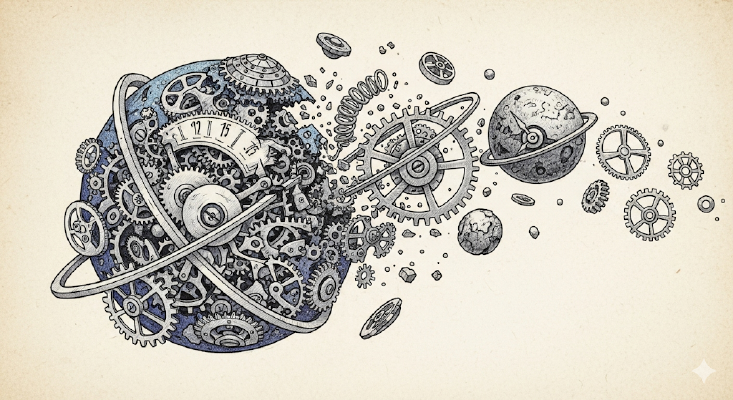Model was prompted to be a shadow writer, ask questions and expand on context. No research or search were made during this process, only redaction of thoughts.
Free Will's Tiny Probabilistic Edge

Is free will an illusion? For centuries, this question has felt like a philosophical deadlock. Arguments often get stuck trying to define consciousness or find a “ghost in the machine.” But what if the problem isn’t how we see ourselves, but an outdated way of seeing the universe?
This isn’t another abstract philosophical argument. It’s a practical case built on two of the most powerful tools we have for understanding reality: statistics and physics. The goal isn’t to “prove” free will directly, but to dismantle the one argument that insists it’s impossible.
The Sheer Statistics of Choice
Think about the number of “choice points” your brain processes in a single day. It’s an astronomical figure, from the conscious decision of what to eat for breakfast to the millions of subconscious neural firings that guide your hand to your coffee cup. Over a lifetime, this dataset of moments becomes almost infinitely large.
Now, let’s consider the possibility of an error in the system—a single event that breaks from the predictable script of cause-and-effect. Even if the chance of such a random, non-deterministic event is microscopically small—say, one in a billion—the sheer number of opportunities makes it a statistical near-certainty that it will happen.
It’s like looking for a single typo in a giant library. The error rate might be tiny, but with millions of books, you’re bound to find one. Once that single break in causality occurs, the future is forever “tainted” with uncertainty. The perfectly predictable timeline is gone.
The Determinist’s All-or-Nothing Bet
This statistical reality presents a huge problem for the hard determinist. To maintain that free will is impossible, they can’t just argue that non-deterministic events are rare. They have to argue that they are impossible. Their claim must be absolute: the probability is exactly zero.
This forces them to make an all-or-nothing bet on a “clockwork universe.” This is a vision of reality as a perfect machine, a system so flawlessly predictable that if you knew the state of every atom, you could calculate the future with 100% accuracy. For their argument to stand, this isn’t just a neat idea—it’s a strict, non-negotiable requirement.
Where the Clockwork Breaks
For a long time, the clockwork universe seemed plausible. Newton’s laws painted a picture of an elegant, predictable reality. But in the 20th century, science itself threw a wrench in the gears.
Quantum mechanics revealed that at its most fundamental level, the universe doesn’t run on certainty. It runs on probability. The Heisenberg Uncertainty Principle, for example, tells us it’s not that we are bad at measuring things; it’s that there is a fundamental limit to what can even be known. A particle doesn’t have one precise location until we interact with it; it exists as a wave of potential locations.
This discovery shatters the foundation of absolute determinism. The perfect, predictable machine required to lock out the possibility of free will simply doesn’t match the reality we live in.
A New Space for Free Will
So, where does this leave us? It leaves us in a universe with wiggle room.
The scientific case for absolute determinism has collapsed. This doesn’t automatically “prove” free will exists, but it fundamentally changes the debate. The argument is no longer about trying to find a ghost in a perfect machine. The machine itself is not perfect. It has gaps, uncertainties, and is fundamentally probabilistic.
In this more accurate model of the universe, our deeply ingrained experience of making choices and forming intentions can no longer be dismissed as a simple illusion. The primary argument against it has been invalidated. There is now space for our will to be a genuine factor in the unfolding of events.
So, is free will an illusion? Perhaps the better answer is that the one reality where it must be an illusion—a world of perfect, unbroken causality—is itself not real. In a universe that runs on probability, the idea that we have a say in our own story isn’t just a comforting thought. It’s a scientifically plausible one.
Przemysław Alexander Kamiński
vel xlii vel exlee
Powered by hugo and hugo-theme-nostyleplease.